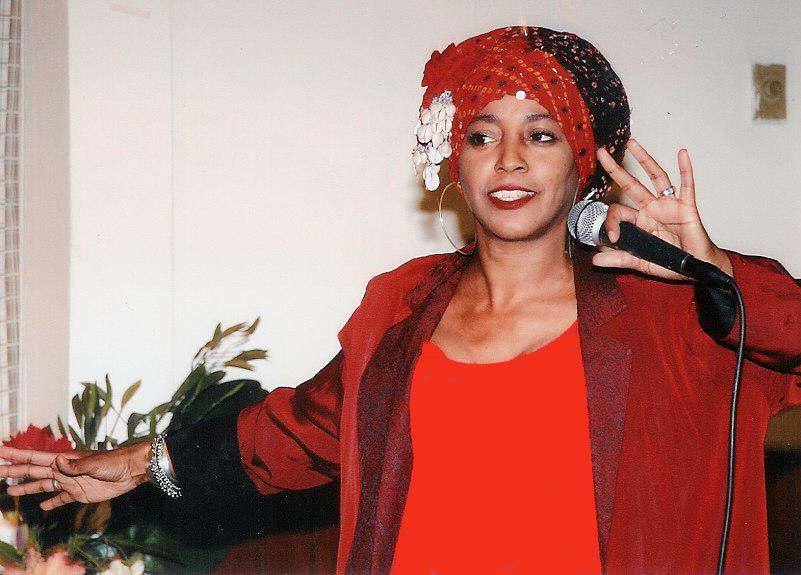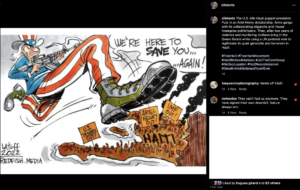by Ezili Dantò
“Koralen’s Vyewo, expresses a soul grief so profound, it curves around, embraces and heals.” –Ezili Dantò of HLLN
Vyewo, travay Koralen, sung by Emlin Michèl
In this time where the US occupiers of Haiti are using earthquake donation monies to build factories for foreigners at the Caracol industrial park.
In this time of the evictions of Haiti peasants and massacre at La Visite in the South by the neoDuvalierist Martelly government to make way for foreign businesses, hotels and residences, we must recall, the eviction of Haiti peasants from their lands and their mass deportations to sugar cane fields abroad back during the first occupation.
I was reading about the significance of the Vyewo – the Haiti laborer first sold by US occupiers to go work in the cane fields in Cuba, Dominican Republic and throughout the little republics in the Caribbean and Latin America. How, under the first US invasion and occupation of Haiti (1915 to 1934), when the sisal, rubber and sugar plantations failed, the US occupiers began making money by marketing and selling Haiti workers.
I was reading about this use of Haiti lives in a review of the novel called Viejo by Maurice Casseus, written in 1935, when I first heard the famous song called, Vyewo, written by Koralen (Jean Claude Martino), covered by many Haiti artists. Koralen’s iconic song is embedded in three audio players here, as sung by internationally acclaimed Emline Michèl, the newer artist Dyaoule Pemba, then followed by the original Manno Charlemagne hit.
Under the first US occupation, the US Marines virtually put Haitians back in chains. The example most often given to evidence this brutal subordination is the Marine’s institution of chain gang-type forced labor to help construct roads for the US businesses and plantations put into Haiti at that time.
What’s nearly always left out is the Vyewo – the actual marketing and sale of the migrant Haiti sugarcane cutter to go work, do hard labor overseas at US plantations.
Could this US form of colonial practice and servitude be repeated again on the same widespread level, sometime in this second US occupation?
If we forget history, then the sale of Haiti labor to “uplift” Haiti may likely be the next great Paul Farmer, Bann Ki Moon or Bill Clinton idea on how to best use, reconstruct or “heal” Haiti.
This special posting on the Koralen song, Vyewo, links Haiti’s ruptured present to its past, crystallizes why US policymakers (represented in Haiti today by UN envoy to Haiti, Bill Clinton, USAID head Hilliary Clinton, the armies of do-gooder NGOs and UN ) are still stuck on the imperial notion that “Haiti’s greatest asset is its cheap labor.” Still remaining silent and self-serving about Haiti’s riches – vast oil reserves, the money the US makes on exports to Haiti and the $20 billion dollar gold and other untold mineral wealth mostly being clandestinely exported out of Haiti behind UN mercenary guns, unfair trade. It recalls the disorienting Haiti uprooting, the use of and how the anguished Haiti Vyewo first came to be.
The US re-branding of Haiti
The classic Haiti song, written by Koralen (Jean Claude Mariteau), tells the story of the ruptured life of the displaced and alienated Haiti migrant sugar cane worker toiling in the Batèys, spending life abroad in hard, unforgiving labor, not knowing how those left behind are faring, or even if they’re still waiting for their loved ones to return.
When some vyewo does manage the return, most times the disconnect is so wide, what they’ve return to is not what they left behind. Some find it would have been better to live without knowing. Their sacrifices and love unrequited, a burden to the very people they set out to support and empower.
In Maurice Casseus novel, Mario, the viejo, returns to find his childhood love, Olive, has become a prostitute seeking the material advantages and “American branding” that results from intimacies with the uncouth white ex-Marine named Cap.
The uprooting
How many Haitians were raised hearing, for instance, about the two legendary great uncles, generations back, who never returned from the cane fields of Cuba; raised on the aunts and mother stories, their dazed angst and wonderings about what happened to some parent, two brothers?
I know why Haitians who’ve made the u-turns relate so viscerally to the pathos in Koralen’s song. Feel its sounds in our very pores. Reach back to a place that’s no longer there.

Jan 1, 2007 jazzoetry performance in New York
|
On some level of collective memory, we’ve all lived how those who waited for their loved ones to return felt. It’s what Edwidge Dandicat captures so successfully in her novels.
It was a child’s understanding for some of us, the soaking in of a tone of voice heard from a parent but an adult helplessness at seeing a mothers’ endless yearning passed on from a grandfather, a great-grandmother and down through the generations to us now.
I recognize Koralen’s artistry in Vyewo. This deep, Middle-Passage-well of longing for home, for Haiti hearth, warmth, family, affection. I knew its texture long before I first heard Koralen’s Vyewo.
The jazzoetry performance pieces I’ve performed for over a decade now, like Breaking Sea Chains or the Capsized series, touch a bit on this chasm, this need to close distances, for the embrace and sweet innocence of lost blood relatives grown now and strangers; for the touch of the wife or husband one fears has strayed; the mother who died never seeing her sons again; of those thousand souls left behind as the Haiti peasant and urban dweller searches unsuccessfully for a safe place to rest, to work in order to make life better in Haiti. A sunny place that’s become so mythic it’s impossible to reach, to go back to. For now, we literally speak in different tongues, with different points of references. Kreyòl with a strange foreigners accent or no Kreyòl at all.
Vyewo (Lyrics)travay Jean Claude Martineau Nan mitan yon chan kann bò Igwey Vyewo, ou k ap fè Ayiti Vyewo ale, Vyewo tounen Nan mitan yon chan kann bò Igwey Kouzen, m sot fè tè Ayiti |
How the Vyewo came to be
During the first US occupation, the US invaded under the Manifest Destiny and Monroe Doctrines but told their public they were in Haiti to make it a “first class black man’s country.”
Today, they invade under the more politically correct, “bringing democracy, stability or humanitarian aid.” The subterfuge in no way hides the racist, imperialistic enterprise they’re trying so desperately to cover up.
The one-percenters and their Haitian feudal agents would arrange for the overseas travel of the suffering peasant Vyewo, whose lands they’d already taken over for their failed plantations, but who still had to pay these US sponsors for the privilege of placing them in the sugar cane fields of Cuba, Dominican Republic, Panama or at the other Carribean islands then under the U.S. empire.
Entire Haiti villages were emptied out during harvest seasons so that big US agricultural companies could produce sugar, export fruit and vegetables for the international markets. Old timers who had spent their life in such a way are called Vyewo.
Vyewo, The song
Koralen’s song lays bare their life. His song touches us deeply. It captures something Haitian so real, so representative of the Haiti ti malere we know. It viscerally and calmly unravels a Haiti life of perennial hardship, longing and lost. Expresses a disemboweling pathos, a thousand tears, endless aches – what it feels like to live life after insurmountable grief, daily pain, inchoate and cruel hurts, no relief, no oceans to protect you. Abandoned in the stark reality of the Haitian Vyewo.
Vyewo sung by Manno Chalemagne
In the third audio posted here, Koralen’s Vyewo is sung by famous Haiti singer, Manno Charlemagne.
Emline Michèl andDyaoule Pemba’s cathartic versions rise from the depths of our collective African souls. Hailing from places all of us who know these souls, can but only wish to use our lifeforce, as libation, for their redemption. For extending, no matter how long deferred, no matter how futile, no matter if its too late, the peace, release and justice Haiti’s Vyewo must have.
Koralen’s Vyewo, expresses a soul grief so profound, it curves around, embraces and heals. –Ezili Dantò of HLLN
Add a comment:
Powered by Facebook Comments








